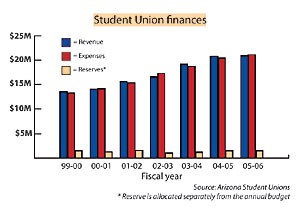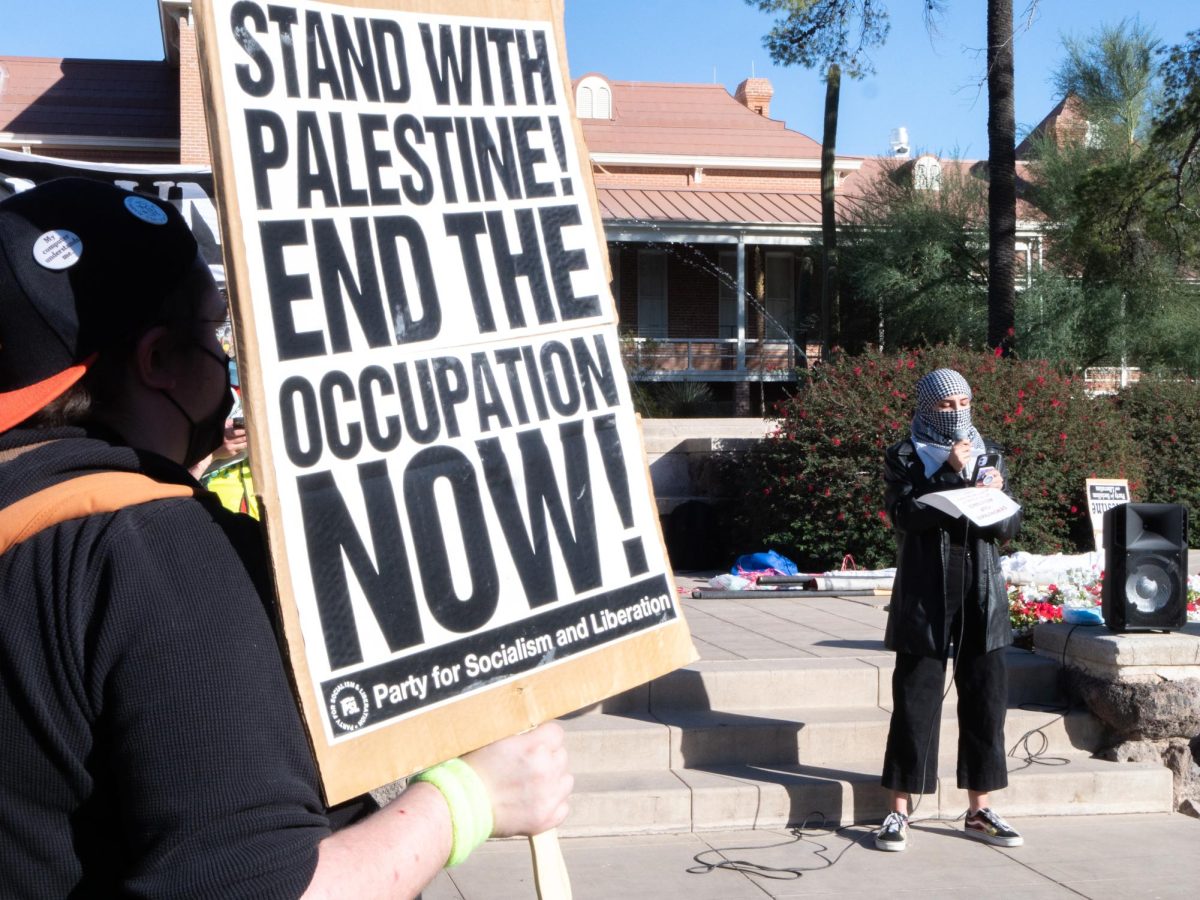Student Union officials are pushing for a new fee next year to help alleviate mounting expenses that have forced the unions to dip into a pool of “”in case”” money that is expected to dry up within the next few years.
Administrators had hoped the new student union fee would be voted on in the student government’s general election next week, but student senators didn’t think that would give them enough time to educate students about the issue, said Erin Hertzog, acting president of the Associated Students of the University of Arizona.
“”When you’re talking about anything involving money, it’s crucial that there’s enough time to inform students and let their opinions be heard,”” Hertzog said. “”We need to create a buzz about this issue. The general elections didn’t offer a sufficient amount of time to do that.””
The union fee is now considered a special election item and will be on a separate ballot for undergraduate and graduate students to vote on April 11 and 12, said Hertzog, a journalism junior.
The need for an additional fee stems from increases in employee expenses for the 235 full-time workers and the more than 700 student employees, which will cost the union an extra $850,000 that it hadn’t prepared for, said Dan Adams, director of the Arizona Student Unions.
These expenses include raises in employee benefits, Adams said, which require the union to pay an additional 38 cents for every salary dollar toward benefits like health insurance and retirement.
This expense, combined with a new state-mandated employee pay raise of 5 percent, has racked up $150,000 in unexpected expenses this fiscal year and a $700,000 increase projected for the next fiscal year, Adams said.
The unions are also looking at another $400,000 in expenses to replace the Park Student Union roof, Adams said.
“”In the past several years, expenses have grown faster than expected,”” Adams said. “”We have been cutting expenses and doing everything we can to maximize the dollars we currently generate.””
To make ends meet, Adams said next year’s budget includes an across-the-board 5 percent increase on all sales and service items. The building hours of late-night facilities, like Cellar and Games Room, will also be reduced from 4 a.m. to 2 a.m. Thursday through Saturday, and 10 p.m. on all other nights.
The unions will also have to borrow about $1 million over the next two years from its reserve fund of about $1.5 million, Adams said.
“”If those projections hold true, the reserve after next year will be reduced to under $500,000,”” Adams said. “”The reserve will be depleted within the next couple of years without a new source of revenue.””
The new source of revenue that Adams and other student groups are looking toward is a fee that would start at $10 a semester in 2007 and increase to $15 the next year and to $20 a semester by 2009-2010.
If approved, the fee would apply to undergraduate, graduate and professional students and would generate about $1.4 million a year by 2010, Adams said.
How this money will be allocated and spent still needs to be determined by student groups before the vote in April, Adams said.
“”Those are important details that we’ll be asking for student input on during the informational forums,”” said Sen. Matthew Boepple, a political science sophomore.
Once student input is gathered, the Student Union Fee Committee will create a long-term plan on how the dollars will be spent and what kinds of services and programs could benefit both undergraduate and graduate students, said Bridgette Gallagher, president of the University Activities Board.
The committee will comprise campus leaders from ASUA, the Graduate and Professional Student Council, UAB, the Residence Hall Association and other organizations, said Gallagher, a political science senior.
“”Students will know where the money is going before they vote,”” Gallagher said.
If the majority of students vote down the union fee, Adams and student leaders will head “”back to the drawing board”” and explore other ways the unions can bring in more revenue, Boepple said.
“”There are other options, and to be honest, I’m not sure if a fee is really necessary,”” Boepple said. “”A different way to increase revenue is by transferring expenses.””
But that’s already been done, Adams said, and has resulted in eliminating the hours of operation for the Center for Student Involvement and Leadership and cutting a matching fund project that supported program collaboration among student groups.
In addition to cutting programs, Adams said next year’s budget includes a user registration fee for student organizations and putting several maintenance and improvement projects on hold.
“”This is a very risky practice,”” Adams said about delaying maintenance projects.
Student leaders want fee to affect all students
The benefits the union fee would bring to the entire student population are unclear to student leaders, who say more details are needed about how the money would be spent before the issue is brought to a vote.
“”I’ve heard lots of promises but not a lot of talk about the programs that would benefit graduate students with this fee,”” said Paul Thorn, GPSC external affairs vice president.
Though a portion of the fee will be allocated toward enhancing student services and programs, Thorn said he isn’t sure how that will benefit graduate students unless it’s in the form of club funding.
“”Typically, graduate students aren’t using the services in the unions to the same extent as undergraduates,”” Thorn said. “”That means every graduate student will pay just as much but will not be as well served by the improvements brought about by the fee.””
Though more undergraduates may use the union on a daily basis, that doesn’t mean graduate students can’t benefit equally from a student-wide fee, Gallagher said.
“”There is still much to be figured out, but the fee isn’t meant to only benefit those who use the union,”” Gallagher said. “”This can have an impact on the entire campus.””
If students vote to approve the fee, their decision will affect generations of students for years to come, which is why it’s crucial to hold informational forums so students can become educated about the issue, said Ben Graff, the voting student regent of the Arizona Board of Regents.
Though the fee isn’t on the “”regents’ radar”” yet, Graff said the board tends to follow the practice of deferring strongly to the student voice when it comes to new fees that go above the cost of tuition.
“”That vote is so important and influential to the regents, you really want to make sure that it’s informed,”” said Graff, a third-year UA law student.
At least two informational forums will be set up between now and April, Hertzog said, where student leaders will discuss the referendum and ask for feedback about the different services, programs and funding possibilities that students would be interested in if the fee is approved.
“”There are still questions being asked, but I expect a lot of them to be answered with student feedback,”” Hertzog said.
The committee will draft a recommendation based on student feedback, which it will forward to Adams. The final proposal will include ideas from both students and Adams, who will send it to the board of regents, Gallagher said.









